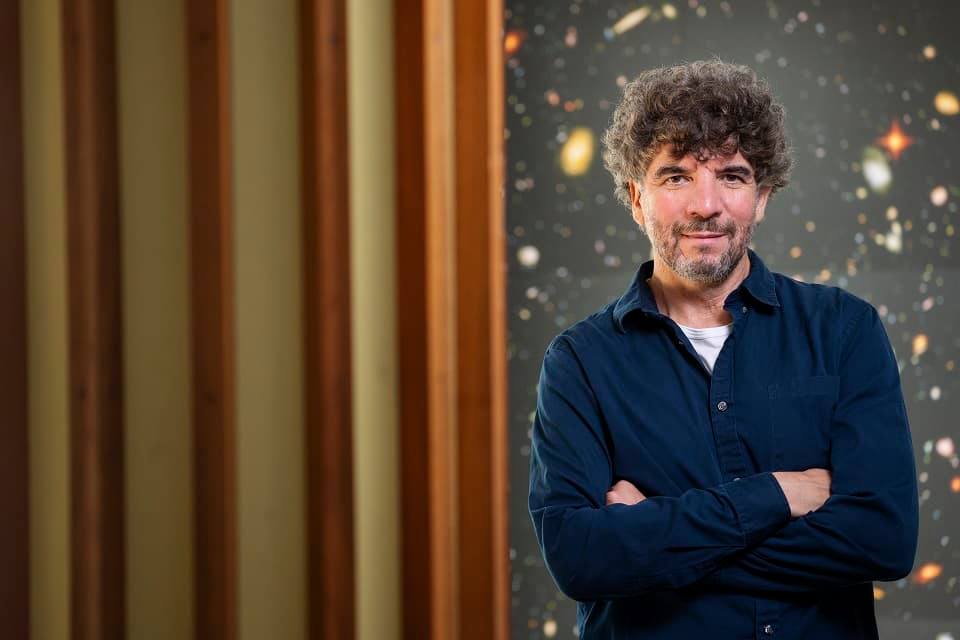Navarro humbly receives world-renowned prize for dark matter halo research

For students in UVic’s physics department, this year’s list of Clarivate Citation Laureates bore a familiar face.
UVic’s own Julio Navarro was recognized, along with two other researchers, for “their fundamental studies of galaxy formation and evolution, cosmic structure, and dark matter halos.”
The award recognizes an exceptionally high citation record in the Web of Science database, which represents over 95 per cent of the world’s top institutions and research agencies. That means that of the over 50 million research papers put out by Web of Science in the last 50 years, Navarro’s work is one of only 6 000 to be cited over 2 000 times. This implies that individuals around the world are actively building on Navarro’s research and that his work will continue to have an impact on the future of physics research for decades to come.
Of the 360 researchers that have been recognized as Citation Laureates, since 2002, 54 have gone on to win a Nobel Prize.
Navarro’s research is focused on dark matter and energy, specifically on dark matter halos, which are clusters of dark matter that form around galaxies. Using the help of supercomputers and an algorithm originally developed by Nobel Prize winner Jim Peebles of Princeton, Navarro and his team have proposed a structure for dark matter halos that is fairly consistent for every galaxy (varying only in scale).
This discovery can help scientists better understand the physics behind galaxy formation and possibly explain the reason for the universe’s accelerating expansion.
Navarro originally comes from Santiago del Estero in Argentina where he completed his studies at Universidad Nacional de Córdoba before completing pre- and post-doctoral work at Harvard and Cambridge. He began teaching at the University of Victoria 22 years ago.
Navarro began doing dark matter research while living as a student in Argentina after the military dictatorship of 1976-1983.
“We were quite behind in what we were doing [in the field of physics],” said Navarro. So in the third year of his undergrad, Navarro and some of his colleagues arranged for four physics experts to come to Argentina to give talks that could help bring the University’s physics knowledge up to date.
“Argentina was coming out of a dictatorship at the time, dark times for the country, but we were young and bold, so we said let’s organize a conference … What you don’t have in talent you should make up for in initiative,” said Navarro.
After speaking with the physicists at the conference, Navarro became interested in dark matter research, which led to his master’s thesis and doctorate on dark matter’s role in galaxy collision, galaxy formation, and the evolution of structure in the universe.
Navarro’s background, coming out of the days of última junta militar (“last military junta”), led him to a focus on fundamental laws, logic, and science over politics. Navarro expounds physics as a study of fundamental laws that cannot be changed.
“There is a logical path to getting to know the universe, because the universe doesn’t care about us. This is not politics, this is not social science where the whole trick is to form an opinion and change opinions,” said Navarro.
But Navarro is humble and recognizes the difficulties of such subjects. “I was very politically active when I was a student. And I had to decide between doing physics or going into politics, and I chose the easier path, which is physics,” he said, laughing.
“As a politician, there are no laws that can not be changed. If you can come up with a better way of making everyone change their minds then you win, for a while, until things change again. It is a moving target, and it’s much more difficult to do than the hard sciences of learning the fundamental laws of nature,” said Navarro.
Navarro is similarly humble when it comes to his recognition as Citation Laureate. Navarro said he is ambivalent towards awards and recognition
“I mean, I feel good that my work had a reasonably good impact on the scientific world,” said Navarro, but claims the awards are “undeserved, but welcome.”
Navarro went as far as to quote Ernesto (Che) Guevara’s famous French words, “Les honours ça ma merde” (honours are [sic] to me).
Beyond honours, and above all else, Navarro is passionate about the research he does.
“Hopefully, the things we are doing today … will lead to the transformation of our understanding of nature that then will lead to a generation of technology then will lead to a revolution or to a better society. Or at least a more advanced society,” he said.
“I research not for my kids, or my grandkids, but for my great grandkids.”
To those interested in science, Navarro encouraged perseverance.
“If I can do it, I think anyone can do it,” said Navarro. “You need a little bit of talent but a lot of initiative, a lot of perseverance, some imagination, and a little bit of a rebel spirit. Go beyond. People will tell you this or that, don’t believe them, ask them why, make them convince you, don’t accept things as they are, and if you do that you will end up … a happy person or a content person with what you have accomplished.”






